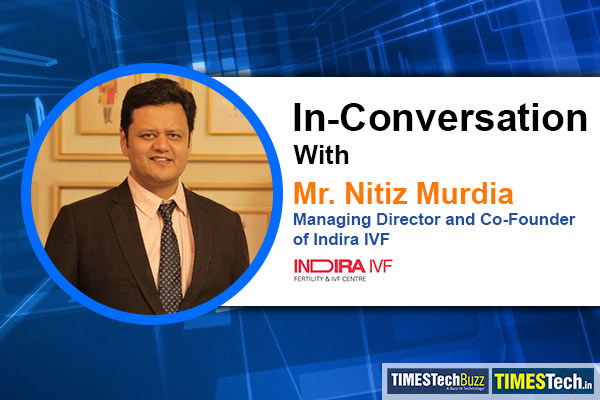Discover how Indira IVF, under the leadership of Mr. Nitiz Murdia, pioneers technological advancements to enhance infertility treatments, ensuring better patient outcomes and satisfaction.
Read the full interview here:
TimesTech: Can you highlight the key technological advancements at Indira IVF and how they’ve improved infertility treatment outcomes?
Mr Nitiz: Indira IVF has made significant technological advancements in the field of infertility treatment. Technological innovations implemented span the entire treatment process – efficiently managing patient records from the very inception, to seamlessly integrating technology into numerous procedures of the treatment journey. These advancements underscore our commitment to leveraging technology for the benefit of our patients’ experience and overall success. Some of the key advancements implemented in Indira IVF and their impact on infertility treatment are as follows:
- Artificial Intelligence (AI) in IVF: AI has been incorporated in assisted reproductive technology (ART)procedures to improve clinical effectiveness and streamline processes. Several AI tools have been implemented to improve the outcome by standardizing the overall process, thereby facilitating improved monitoring and compliance in ART. At Indira IVF centres, we have implemented an AI-powered tool for selecting embryos. This tool improves the embryo selection process and provides patients with a detailed report on the AI’s evaluation of their embryos hence, fostering transparency and building trust in their treatment journey. This enhanced transparency contributes to improved patient outcomes and overall satisfaction. Additionally, we are considering the utilisation of AI for grading gametes, that is, oocytes and sperms, as well as exploring the potential of time-lapse imaging.
- Closed Working Chambers Technology: These chambers provide a controlled environment crucial for handling gametes and embryos, addressing challenges such as temperature shock during the ART process. The technology ensures consistent regulation of CO2 levels, temperature, humidity, and a VOC-free atmosphere. This ultimately aids the development of top-quality embryos and improving pregnancy success rates.
- Electronic Witnessing System: Each biological sample is equipped with a state-of-the-art RFID chip that helps identify and monitor the couple’s gametes as it moves through the procedure. The system has a security system that only allows the embryologist to proceed with the assigned gametes of the respective couples. In case samples from another couple come within the range of the work area, the system blocks the process flow of the user and asks for immediate intervention. It alerts all screens in red and activates an onscreen alarm with buzzer sound to bring the mismatch into the notice of the lab; intervention from a senior staff member is required to unlock it.
- Electronic Medical Record: Our Electronic Medical Record (EMR) system facilitates seamless integration with Application Programming Interface (API), AI and other tools to consolidate all relevant information on a single page. Our comprehensive strategy for patient engagement and efficient healthcare services ensure a user-friendly booking experience. Patients can easily reach out to us through our website, social media platforms, and our customer care support, ensuring a streamlined booking process. We deliver data-driven healthcare services by leveraging data analytics, maintaining continuous engagement through SMS, WhatsApp, email, and automating decision-making processes related to treatment and Inpatient Department (IPD) procedures.
At Indira IVF, we have harnessed remarkable technologies which have impacted the outcome of infertility treatment. Our 120-plus hospitals have state-of-the-art laboratories, high-definition diagnostic imaging, and cutting edge genetic testing. This expands the gamut of treatment options we can cater to as per the patient’s need. The above improvements make the procedures more accurate, minimise risk occurrences in the course of service delivery, and enhance quality services in fertility care. Indira IVF is always ahead with the technological advancements to create hope and fulfilling life for couples facing challenges with fertility.
TimesTech: What is the role of AI in ART, particularly AI-based embryo selection? How does it differ from traditional IVF processes and its benefits?
Mr Nitiz: Through AI, we have made significant advancements in the embryo selection process. Initially, embryo selection relied on manual assessment using the international scoring standard which can have embryologist-to-embryologist variation; this may result in grading the same embryo differently. However, AI has now revolutionised this process as it enables us to identify embryos with superlative accuracy thereby, standardising the process of grading on embryos. In this context, AI plays a crucial role in evaluating embryos, ensuring standardised grading of these embryos, and providing a quantitative prediction score on implantation likelihood in the uterus.
AI-based embryo selection tool has been implemented in our hospitals. This tool not only enhances the embryo selection process but also provides patients with a comprehensive report detailing the AI’s assessment of their embryos. This transparency and added trust in the treatment process contribute to better patient outcomes and overall satisfaction.
TimesTech: Explain the importance of Preimplantation Genetic Testing (PGT) and its impact on IVF success rates at Indira IVF.
Mr Nitiz: Preimplantation Genetic Testing or PGT is an integral element of the success possibility of ART. It is performed for medically indicated cases and it aims to improve the success rates of ART by identifying the genetic irregularities in embryos before their implantation.
Genetic issues due to abnormal chromosomes can lead to implantation failure, miscarriage, or the birth of a child with genetic or congenital anomalies. The three types of PGT (PGT-A, PGT-M, PGT-SR) offer tailored solutions to screen for aneuploidy, single-gene disorders, and chromosomal structural abnormalities, respectively. By employing advanced techniques where embryos have their cells removed for DNA analysis, PGT allows the identification and selection of healthy embryos, which enhances the chances of a successful pregnancy. Advantages of PGT include higher chances of getting pregnant, minimised risk of genetic disorders, better embryo selection, reduced emotional distress, and age-related advantages.
TimesTech: Tell us about the non-invasive technologies used for monitoring fertility and reproductive health in your treatments.
Mr Nitiz: As mentioned earlier, in our fertility practices, we use non-invasive technology, particularly Preimplantation Genetic Testing for Aneuploidy (PGT-A), to address abnormal number of chromosomes in human embryos. This improves pregnancy rates, speeds up conception, reduces the need for multiple transfers, lowers miscarriage rates, and optimises costs especially in advanced maternal age cases. Hence, we are looking for ways to derive the benefits of PGT- A, with non-invasive techniques such as the use of embryonic cell-free DNA (cfDNA). Non-invasive Preimplantation Genetic testing (niPGT) eliminates the need for embryo biopsy by using Spent Culture Medium (SCM) from the cultured embryos. SCM is analysed, providing valuable insights into genetic information and cellular health without directly performing a biopsy on the embryos.
Based on this approach, there is a potential prospect of enhancing lives births ratio, reducing miscarriages and multiple pregnancies, and shortening the duration till a successful pregnancy without potential complications arising from embryo manipulation and biopsy.
TimesTech: How have technological advancements contributed to increased success rates in ART at Indira IVF?
Mr Nitiz: Indira IVF is a technology-first company and we are constantly adding new cutting-edge technologies to make IVF treatments safer and at the same time, cost-effective. With the introduction of the latest technologies we see an increased rate of accuracy and efficiency. These innovations have revolutionised the monitoring process to the advantage of both patients and their doctors.
Our “Closed Working Chamber Technology” mimics the environment of the human body, with the required temperature of about 37˚C, optimum levels of oxygen, and carbon dioxide. When the eggs and sperms are manipulated outside the body, they can experience temperature shock due to the variation in temperature levels compared to the body temperature. This may affect the quality of embryos leading to poor outcomes. Microscopes are placed in these chambers so that eggs and embryos can be handled in body-like conditions, eventually producing better quality embryos and providing higher success rates.
The second important technology is electronic witness technology through which we ensure that the process of double-checking is automated in order to avoid mix-up of unrelated sperm, egg or embryo in the laboratory. With RFID technology in our labs, every sample is labelled with an RFID chip which detects gametes from the same couple when samples are brought close; conversely, an alarm is sounded when the samples get mixed-up to halt the process.
AI is a distinguishing factor at Indira IVF. So far, eggs, sperms and embryos have been graded manually through the human eye under microscopes, which has a risk of human error. Using AI to grade embryos, pictures of the same are graded by a software by comparing it with a database of existing embryo images from prior cycles. This software is equipped with machine learning and through its database, it can analyse the best embryo to transfer thus, maximising the chances of pregnancy. All of these technologies are aligned with our strict SOPs. Our trained embryologists across all our centres in the country and is scalable, making Indira IVF stand apart.
TimesTech: How does technology help make infertility treatments more affordable and accessible at Indira IVF?
Mr Nitiz: Technology plays a crucial role in streamlining the infertility treatment process at Indira IVF. By making diagnostics more precise, reducing the need for physical visits, optimising treatment plans, and improving data management, technology helps reduce the financial burden on patients. This makes infertility treatments more affordable and accessible to a broader spectrum of individuals and couples. Seven to eight years ago, a single cycle used to cost between Rs 3 to Rs 4 lakhs, but with the advancement of technology and standardisation of procedures the current costs for similar procedure now ranges between Rs 1.5 to 2 lakh. Despite this, we still witness a surge in success rates due to investment in proper talent and technological advancements. With the help of advanced technologies and improved patient care, Indira IVF has an overall success rate of approximately 74%.
















